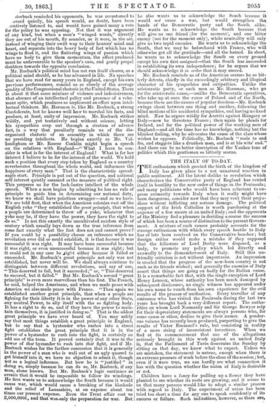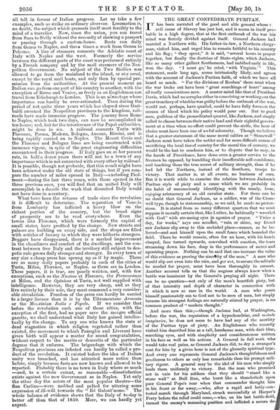THE ITALY OF TO-DAY. T HE enthusiasm which greeted the birth
of the kingdom of Italy has given place to a not unnatural reaction in public sentiment. All the latent dislike to revolution which characterizes the Conservative party of England has vented itself in hostility to the new order of things in the Peninsula; and many politicians who would have been reluctant to ex- press animosity towards Italy when it really might have been dangerous, consider now that they may vent their preju- dices without inflicting any serious damage. The political support of the Irish Catholics is worth purchasing at the expense of a few sneers at an united Italy; and the opponents of the Ministry feel a pleasure in deriding a course the success of which has been a source of distinction to the present Govern- ment. A mixture of such causes probably accounts for the strange enthusiasm with which every speech hostile to Italy has of late been received on the Conservative benches ; but foreign critics would make a mistake if they supposed that the followers of Lord Derby were disposed, as a body, to promote any policy which led directly and avowedly to the dismemberment of Italy. Still this un- friendly criticism is not without importance. An impression is created that the progress of the new-born country is not such as its friends wished ; and generally the enemies of Italy assert that things are going on badly for the Italian cause. It is a remarkable fact that, with the single exception of Lord Henry Lennox, whose authority has been much damaged by subsequent disclosures, no single witness has appeared under his own name to vouch from his own experience for the evil results of the process of unification. Every traveller of any eminence who has visited the Peninsula durino° the last two years has brought back a very different report. The autho- rities on whom Lord Normanby and Sir George Bowyer rely for their depreciatory statements are always persons who, for some cause or other, decline to give their names. A ponder- ous volume has recently been produced, purporting to give the results of Victor Emanuel's rule, but consisting in reality of a mere string of inconsistent invectives. When we find at its commencement that one of the allegations seriously brought in this work against an united Italy is, that the Parliament of Turin desecrates the Sunday by sitting on that day, we know what to expect. -Unless we are mistaken, the statement is untrue, except when there is an extreme pressure of work before the close of the session ; but, even if it were true, we can hardly see what connection it has with the question whether the union of Italy is desirable or not.
Children have a fancy for pulling up a flower they have planted to see whether its roots are growing, and it seems to us that many persons would like to adopt a similar process with regard to Italy. The experiment of union has been tried too short a time for any one to speak confidently of its success or failure. Such indications, however, as there are,
all tell in favour of Italian progress. Let us take a few examples, such as strike an ordinary observer. Locomotion is, no doubt, the subject which presents itself most forcibly to the mind of a traveller. Now, since the union, you can travel from Susa to Sicily without the necessity of showing a passport or passing through a custom-house. Boats run daily from Genoa to Naples, and three times a week from Genoa to Palermo. A lino of steamers connects the Adriatic coast of
Italy with Naples and the west. Formerly the service between the different parts of the coast was performed entirely by a French company and by the mail steamers of the Nea- politan Government. No subject of the Two Sicilies was allowed to go from the mainland to the island, or vice versa,
except by the royal mail boats, and only then by special per- mission from the authorities. At the present moment an Italian can go from one part of his country to another, with the exception of Rome and Venice, as freely us an Englishman can travel from Edinburgh to London. This is an advantage whose
importance can hardly be over-estimated. Then during the period of not quite three years which has elapsed since Gari- baldi annexed the Neapolitan provinces to the kingdom, rail- roads have made immense progress. The journey from Rome to Naples, which took two days, can now be accomplished in ten hours; and, but for the interference of the Papal authorities, might be done in six. A railroad connects Turin with Piacenza, Parma, Modena, Bologna, Ancona Rimini, and is being rapidly carried on to Naples. The Mount Cenis and the Florence and Bologna lines are being constructed with immense 'rigour, in spite of the great engineering difficulties encountered in their progress. If Italy goes on at her present rate, in half-a dozen years there will not be a town of any importance which is not connected with every other by railroad. It is possible, though not probable, that this result might have been achieved under the old state of things, but if yoti com- pare the number of miles opened in Italy—excludinc, Pied- mont—during the last three yeais, with those opened in the three previous ones, you will find that an united Italy will accomplish in a decade the work that disunited Italy would not have done in a century. What have been the returns of trade since the revolution it is difficult to determine. The separation of Venetia from Lombardy has inflicted a heavy blow on the richest portion of the country, but the broad signs of prosperity are to be read everywhere. Even the towns like Florence, which were formerly the capital of small states, have profited by the change. New streets and palaces are building on every side, and the shops are filled with articles of luxury to which they were hitherto strangers. Beggars have disappeared, there is a marked improvement in the cleanliness and comfort of the dwellings, and the con- trast between free Italy and the territory still subject to des- potic rule grows daily stronger and stronger. In every town of any size a cheap press has sprung up as if by magic. There are as many daily papers probably in each of the cities of Turin, Milan, Florence, or Naples, as there are in London. These papers, it is true are poorly written, and, with few exceptions, such as the .dazione at Florence, the Perseceranza at Milan, and the Opinione at Turin, not well supplied with intelligence. However, they are very cheap, and as they live entirely by their sale, they must command a very consider- able circulation. Freedom of the press can hardly be carried to a larger licence than it is by the Ultramontane Armonia or the MaLzinian Italia e Popolo. If we consider that before the revolution each one of these cities, with the exception of the first, had no paper save the meagre official gazette, we shall understand what Italy has gained intellec- tually by the change. To any one who knows the state of dead stagnation in which religion vegetated rather than existed, the movement to which Paisaglia and Liverani have given birth will appear a matter for sound congratulation, without respect to the merits or demerits of the particular dogmas that it enforces. The brigandage with which the Neapolitan provinces are infested can hardly be called a pro- duct of the revolution. It existed before the idea of Italian unity was broached, and has attracted more notice than before simply because facts are now known and allowed to be reported. Probably there is no town in Italy where so much —and, to a certain extent, so reasonable —dissatisfaction exists against the new Government as in Naples. Yet only the other day the actors of the most popular theatre—the San Carlino—were mobbed and pelted for uttering some expression of ill-will towards the "Re Galant'uomo." The whole balance of evidence shows that the Italy of to-day is better off than that of 1859. More, we can hardly yet expect.































 Previous page
Previous page